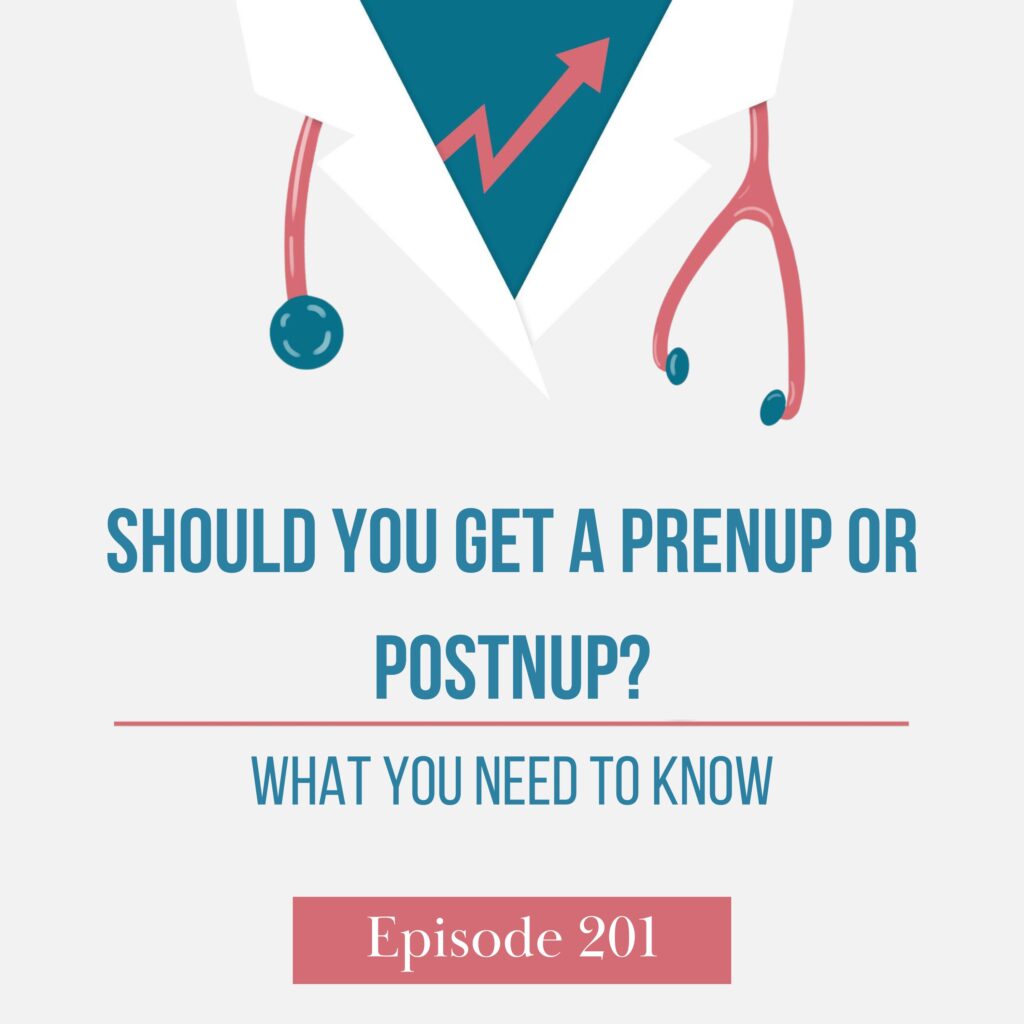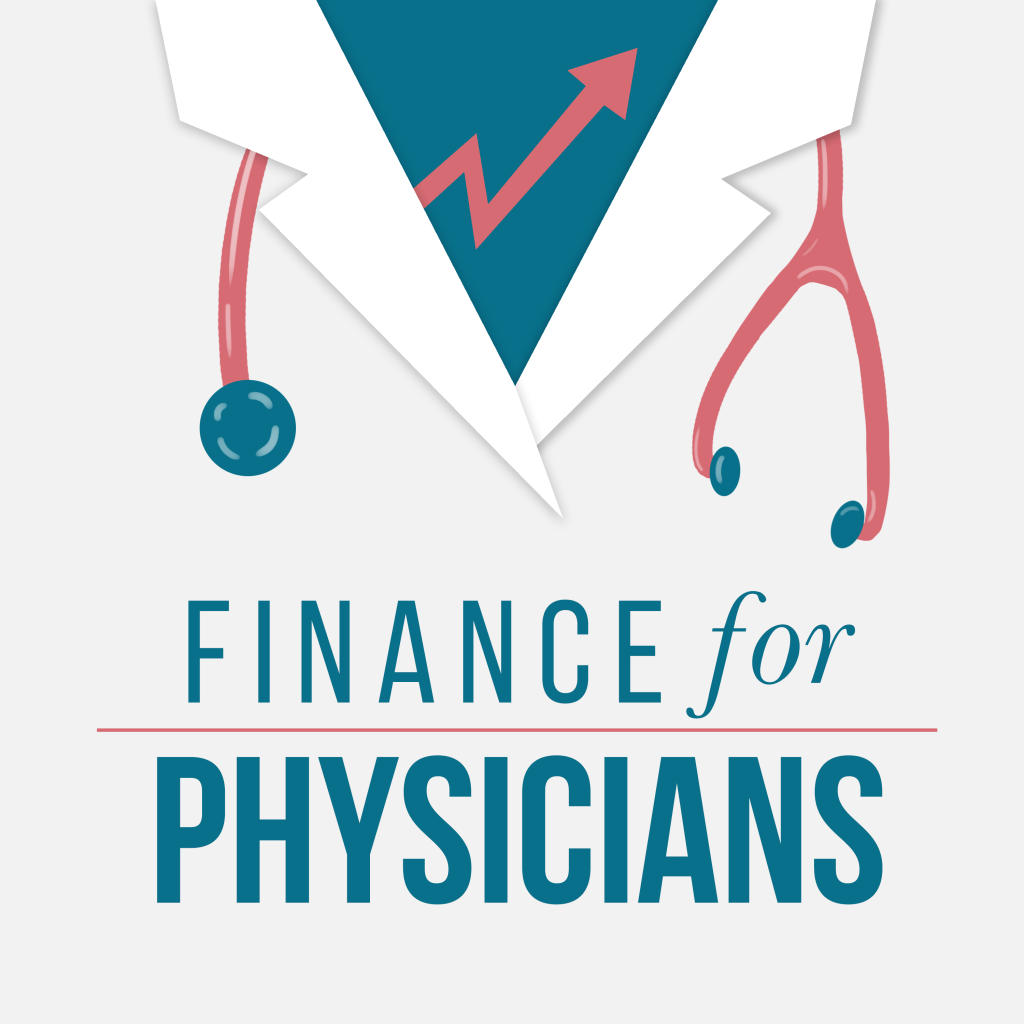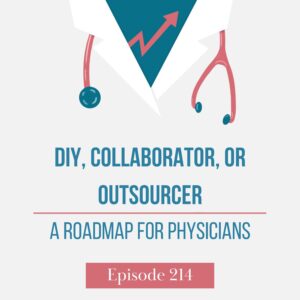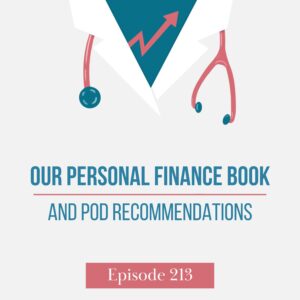Should you get a prenuptial or postnuptial agreement?
Talking about these is not exactly romantic, but it might be one of the smartest financial conversations you’ll ever have.
In this episode, we’re joined by Heather Lovallo to break down what prenups and postnups are, when they make sense, and how they can actually strengthen your marriage.
You’ll learn why these agreements aren’t just for the ultra-wealthy, how they can help avoid messy legal battles, and the surprising ways they support better financial communication as a couple.
—————————————————————————————————————————
Transform your financial outlook today! Access our exclusive free resources for physicians and conquer financial stress. Access here. P.S. We value your opinion! Share your thoughts and insights with us. Your feedback helps us improve and tailor our content to your needs. Click here to give us a piece of your mind.
Links
- Vitals Check: Your Money Game Plan for Post-Residency Life course link: https://courses.financeforphysicians.co/pages/vitalscheck
- Use code PODCAST for 50% off (valid through August 31st)
- Connect with Heather Lovallo
- Connect with me on my LinkedIn
- Contact Finance for Physicians
- Finance for Physicians
- To schedule a call with one of our awesome planners, book HERE.
Full Episode Transcript:
Heather Lovallo: The clients that we work with and the types of people who would be listening to our podcast are people who presumably at least one partner is going to have what would be considered a high income. And the hope would be that you are increasing your net worth over time. You are increasing those retirement plans, those taxable accounts, the assets, maybe we’re getting some real estate.
These are the types of things that you would expect to accrue as a married couple. And so it’s thinking ahead about, “Okay, would we think about divvying that up 50/50 or would we not?”
Welcome to Finance for Physicians, the show where we help physicians like you use money as a tool to live a great life. I’m your host, Daniel Wrenne, and I’ve spent the last decade advising physicians on their personal finances with the mission to help them understand that taking control of their finances now means creating a future where they can practice medicine where, when, and how long they want to.
Daniel Wrenne: Heather, how’s it going?
Heather Lovallo: It’s going well. How are you?
Daniel Wrenne: I’m doing good. I’m excited to talk about the subject today. We’re gonna talk about—it is a little bit of a dicey topic, so we were prepping beforehand. There’s lots of strong opinions in the world around this topic. We’re gonna try to talk through the way this works, the educational aspect of the vehicle we’re gonna talk about, and I think there’s some value to be had from understanding how some of this stuff works if you’re married or considering getting married. So what are we gonna be talking about today, Heather?
Heather Lovallo: We are going to be talking about prenuptials and postnuptial agreements.
Daniel Wrenne: Yes.
Heather Lovallo: I know some of the listeners are already like, “Peace. I’m out.”
Daniel Wrenne: I was trying to think if this is less desirable. I think this might be even less desirable than a will. What do you think?
Heather Lovallo: It may be. And that’s saying a lot, but I really do hope that listeners will stick around because I was fascinated by some things that I learned in doing research on this topic.
And so I think at the very least, people will find it interesting to learn about, if not something that they maybe want to implement in their own lives.
Daniel Wrenne: Yeah. So maybe we could start out prenuptial, postnuptial. What exactly are we talking about here? What is a prenuptial agreement? What is a postnuptial agreement?
Heather Lovallo: Yeah. Yeah. So at the base level, these agreements are legal contracts. In the past, they are things that typically would have been drafted by one and maybe two attorneys, and then agreed upon by the couple. If it’s prenuptial = before getting married, postnuptial = after getting married, but it is something that is in writing.
You both sign on the dotted line about it, and you are basically saying, “We are agreeing about what is going to happen with specifically our financial assets in the event that we were to get divorced.”
Daniel Wrenne: Yeah, and they are like any legal document. There’s a lot of flexibility, like you can structure them in a lot of different ways.
But like I was saying, they can get—this is a kind of a dicey topic and it’s not the most desirable. It’s, “Hey future spouse, you wanna talk about divorce?” “Whoa, bro.” We just, but like—
Heather Lovallo: Yeah, so I—
Daniel Wrenne: We can talk about some of the more obvious situations where it applied.
Like I think there’s some pretty obvious situations where it’s more common or more likely to come up. Maybe we could start there ’cause that’s a little less debated or controversial, I guess, or contested.
Heather Lovallo: Sure. Sure. Yes, absolutely. In the past, and even currently, even myself coming into this I thought of this as like insurance against a messy divorce and keeping things from going into litigation, if I were to get divorced and that was probably the approach that most people would be using to do a prenup. But that being said, and we’ll get into it in a bit, but it’s actually very different or can be very different from that. But to your question about, in what situations are a lot of times prenups recommended, a lot of times it’s gonna be recommended if there are specific assets or even debts that you want to keep separate, as in not be considered joint assets or debts after the marriage.
So think about things like if there’s an investment property that is going to be coming to one of the spouses when their parents die, and it’s very important to the family that it remains in the family no matter what.
That might be an example of something to consider getting a prenup for. Similarly, if you’re expecting to receive or have already received an inheritance, that’s very important to keep as separate family property. That’s another reason if we’re talking about blended families, maybe where people already have children from a prior relationship, maybe in which there’s child support being paid or coming in for one of the soon-to-be spouses.
That’s another great example of a reason to consider it. And then also if either one of you are owners or plan to be part owners of a business in the future, that’s another great reason to consider having a prenup.
Daniel Wrenne: Yeah, so those are definitely more common triggers that prompt it. Really, anybody can have a prenuptial or any marriage prior to can set up a prenuptial or postnuptial after getting married.
So anybody can set this up and it’s potentially of benefit, based on what your personal beliefs are, at the end of the day, it is like you’re describing more insurance, or you could look at it like that, like insurance around settling things when you’re happy and smiling.
And if it were to happen in the unlikely scenario, because most divorces, if hopefully, if you were to get divorced, it would be a peaceful experience, but most of them, I’m sure you guys listen and have seen some that are pretty contested. We’ve worked with some clients who have had divorce, and I’ve had them in my family, and it seems extremely rare that they’re actually peaceful, and so they’re typically very contested. And that’s typically because they’re relying on courts to decide all the stuff.
Heather Lovallo: Right.
Daniel Wrenne: And that’s essentially what the prenuptial does is ahead of time, it decides all the stuff.
Heather Lovallo: Yeah. And as I’ve been doing my research, what I’ve heard over and over again from those who are in the business of creating prenups and postnup, they often refer back to the fact when it is a fact that if you don’t have one in place, you are going to default to what your state’s laws would be in the event that you were divorcing and you couldn’t come to an agreement.
And like you said, it’s very rare, at least anecdotally, to see couples that are divorcing amicably and going to be able to agree on every single aspect of the division of their assets.
Daniel Wrenne: Right. And that might be okay. I guess it wouldn’t hurt to understand your state’s laws ’cause they’re different. But when I got married to Allison, we were young and had nothing.
Heather Lovallo: Yeah.
Daniel Wrenne: And we’re like, we refuse to get divorced. But that everybody, I’m sure, says that on the front end, but so it was like, sure. And then even if something crazy happened and we were to get divorced, we were both kinda, “Eh, it would be fair to split things up equally.”
And that was the extent of where we took it. And so we were like, no need for a legal document. Plus who wants to drill into the complexity or the weeds of ironing out the specifics of it? But this is me coming from my perspective as someone that has not gone through that, we’ve fortunately had a good marriage and everything’s gone well.
And also we didn’t have a lot. We had no assets and it would’ve made sense to have, ’cause all of our assets have been built up through while we’ve been married. So I don’t know how much it—I’m just curious would the prenuptial agreement, how would it even handle assets post-marriage?
Heather Lovallo: Sure, sure. The fact is you get to decide that when you’re creating the prenup. And that’s really the point. And it is very important to say that in times past and even as I was approaching my research on this, the question surrounding, if I’m not planning to divorce and I’m not rich, is this even something that would make sense for somebody to have?
And so thinking through. As you are accruing assets as a married couple, a lot of times there can be different thoughts post a marriage about how maybe that should be divvied up based on who was earning what, based on who maybe was able to contribute a larger portion to a house down payment, or maybe who became a partner in a business practice.
Those are the types of things that maybe you didn’t think about whenever you were first getting married, but the clients that we work with and the types of people who would be listening to our podcast are people who presumably, at least one partner, is going to have what would be considered a high income.
And the hope would be that you are increasing your net worth over time. You are increasing those retirement plans, those taxable accounts, the assets, maybe we’re getting some real estate. These are the types of things that you would expect to accrue as a married couple. And so it’s thinking ahead about, “Okay would we think about divvying that up 50/50 or would we not?”
And it may be that even as you were to sit there and think about it right now, even if you’re in a loving relationship, you still might not think that, “Oh, it should be split 50/50.” Like both of you might agree that it, maybe it shouldn’t be 50/50 because of extenuating circumstances. And so those are the types of things that a prenup takes into consideration.
Is it that one spouse is staying at home, taking care of the kids? And so there are some financial considerations that would need to be addressed there? Is it, like I said before, where maybe one person has a parent who was gifting them a certain amount towards a home down payment. And maybe there were some unwritten strings attached with that as far as we really would like to keep this in the family.
Maybe there’s an inheritance that came after the fact. These are all things that could be built into the prenup.
AD BREAK
Daniel Wrenne: I wanted to take a quick break to share some exciting news. Our new course, Vitals Check: Your Money Game Plan for Post-Residency Life, is now live. If you’re finishing training or just getting started as an attending, this course is for you.
It’s taught by me and my team, the same financial planners you’ve been hearing from on the podcast. We’ll be walking through big money decisions you’re facing right now. Things like what to do with your student loans or how to make smart housing decisions, and where to start investing.
You’ll also gain access to proven tools and templates that will help you set goals, track your money, and build a plan that fits your life. And just for listening to this podcast, you can get 50% off if you sign up by August 31st. Just make sure to use the code PODCAST at checkout. You can register now at financeforphysicians.co, and we’ll make sure to include the course link in the show notes.
AD BREAK END
Daniel Wrenne: My example, and someone that’s like my example, I was younger and didn’t have assets, and that’s a different circumstance. I think that’s probably more of like personal preferences and more about your own values and how you view all this stuff, and it’s gonna vary by circumstance a lot. Now, the earlier examples you were given, there’s a little bit more concrete, I think are more likely scenarios where it makes more sense.
I’ve worked with people that have children from prior marriages and lots of assets, or a spouse that passes away. Those kinds of things are much more I think concrete benefit at getting prenuptial because you start to, ’cause when you enter into second marriage or you have a big asset existing, especially a business that’s, in itself, a very complicated legal organization or whatever.
Heather Lovallo: Right. Right.
Daniel Wrenne: So you kinda have to at least think about every, this doesn’t hurt to consider. I’m sure many people have thought about this, but it’s definitely not—no harm in bringing up the topic with your spouse. But I think looking at those circumstances that are a little more cut and dry, I think it’s easier for me to talk through scenarios with those, because they’re less personal preference.
For example with the children from prior marriages or the prior assets, the businesses, that kind of thing. What does that process typically look like? I guess we could talk about the young person as well. What do you go? Is it like getting a will? Will you find an attorney?
You go talk to them, you have the conversation with your spouse. Do you talk to separate attorneys? Do you do it as a couple? I haven’t gone through it myself.
Heather Lovallo: Sure. And to be clear, I have not gone through this process myself either, but in doing my research. I was really fascinated at how different things are from what I was expecting based on all of the crazy things that you see, for example, in movies about how you’ve got one rich person whose family is really pressuring them to send over this prenup agreement to the soon-to-be spouse and they’re surprised and shocked. Just before the wedding kind of a thing.
And so that was what I had envisioned, or what this process entailed, but it actually is very different and I would say it also seems to be quite an evolving, I hate to say industry, but there are providers that you can find that are basically online, and you would be able to complete the whole process virtually.
I’ve found a couple of different websites that provide for that and provide the option to work with an attorney, specifically in whatever state you’re in. But again, everything is virtual. And so from a time perspective, it’s pretty simple overall. And same thing with how much it costs. Of course, that can vary drastically depending on your circumstances and what you go for.
But it is something where you can use a lawyer, both of you have your own attorney, or it could be something where both of you are using the same service and don’t even have to use an attorney in order to draft the document. And with a couple of these services that are offered online that I’ve found, there’s essentially a template and like a questionnaire that you go through together as a couple.
No matter what the process is going to entail, listing out each of you list out separately. All of your assets, all of your liabilities, and this is similar to what we would do with the families that we work with. If we were doing a financial planning engagement to say, “Okay, we need to make a list of all of your accounts. We need to know what the balances are. What insurance policies do you have?”
For life, for example, listing out who the beneficiaries are. These are the types of things that we would have our clients do, and it essentially is taking you through that process for this prenup. And then from there it’s determining, “Okay. What would we want to have happen with assets that are already in existence now? What would we want to have happen with assets that we accumulate during the marriage?”
And the prompts of the templates and the questionnaires actually get into a lot of other things too, or they can, regarding if you were to have children together, if there were to be a business, all of the things that we’ve talked about, if there were to be an inheritance.
The things that we’ve already mentioned. How would we approach that today as a couple? How would we want that to be divvied up if it came to that? The other thing that I’ve found out that I really was completely ignorant of is that prenups can also include talk and agreement about how you are going to manage finances while you’re still married.
And so that was a big aha moment. So essentially, okay, we get married. What happens with our accounts? Are we going to now put all of our bank accounts retitle them as joint accounts? Are we gonna keep separate accounts? Where’s the direct deposit going to go? How are we going to pay for household expenses if somebody is making more than the other spouse, are they going to proportionately pay for household bills accordingly? Is it going to be per ratio? Is it gonna be 50/50 no matter what? These are the types of things that can be hammered out even within the prenup, within the marriage while you guys are still together, how much are we gonna be saving for retirement?
How are we going to prioritize surplus cash? These are all things that can be hammered out and outlined in a prenup. You can even outline things like if we are going to experience any issues and one person really wants to go to marital counseling, for example, you can put in the prenup. Okay. If somebody says, “Hey, I feel like we need to go to counseling,” we gotta go to counseling.
So those were things that were really surprising to me and were aha moments of Oh, fascinating. Interesting. Definitely a different approach and a more collaborative approach to marriage than what I had originally thought a prenup would entail.
Daniel Wrenne: Yeah, I think the conversation part is the key, like I know of clients that have gone through prenuptial process, and I think maybe the default is that they just don’t have really much conversation around it, and it’s just like the attorneys send the documents. And then they assume, and it’s like that’s not very helpful. Like just ’cause they don’t, a lot of times, even know exactly what’s in there, but having the hard conversation where you’re like, what are your thoughts on this? How do you feel about this? What’s most important here with your spouse or future spouse, that’s for sure always good. That’s basically what marriage counseling is.
That’s basically, I don’t even think I wanna call it marriage counseling. I think that’s good marriage relationship communication 101.
Heather Lovallo: Right.
Daniel Wrenne: Have deep important conversations with your spouse or soon-to-be spouse about super important serious matters. So if you haven’t talked to your spouse or future spouse about divorce, that’s a good starting point.
Like definitely talk about what your views are on divorce and what—I feel like that’s a—maybe this is unique, but Allison and I have definitely talked about our feelings about divorce at least a thousand times.
Heather Lovallo: Sure.
Daniel Wrenne: Like our views on what we would do if something were to happen. We have talked about that many times.
It’s like, “If I caught you cheating, I’d kill him.” No, maybe that has been said actually. But.
Heather Lovallo: When we work with our clients the families that we work with, you probably would echo this. There seems to be a lot of harmony that is added to a relationship when they are able to communicate about finances.
And so we see that in our meetings with clients, when both spouses are showing up to the meetings and able to provide their feedback. When we’re talking about goals and talking about implementing action items, I would say that that tends to be anecdotally a great indicator of how well things are going in the marriage, quite frankly.
Whether or not people are in alignment and it really comes down to, like you said, communication and the ability to have conversations that might be uncomfortable or about things that are a little bit dicey, or maybe they’re not in agreement, but they’re able to respect and value each other’s perspectives and still come to an agreeable way to implement a financial plan.
And I suppose, that’s again, what was surprising to me as I was looking at a more modern perspective, a more modern process on creating prenuptials to see that, okay, this is actually about collaboration, communication. It’s not about trying to come at it from a litigious, argumentative way in which we each have an attorney, and we already have boxing gloves on before we’ve even gotten married.
From what I see of the more modern process, it’s the complete opposite.
Daniel Wrenne: Yeah. Now every attorney, every service is gonna be different. I think it’d be worthwhile. Like I said, I think the conversation is the key part, and the legal document is just essentially like outlining what the conversation was.
I don’t know that everybody looks at it that way. They’re just like, let’s check the box for the thing. And so even in a business deal, like if you have partners, I guess you do a prenuptial there as well. We were talking about that a minute ago. Like I have business partners, so it’s, you kinda have to, or ideally you have a legal agreements that dictate what happens with everything, if things split up or whatever.
But the part that’s key is the conversation that you have with the person. It’s not the legal document. The legal document is just a representation of the conversation.
Heather Lovallo: Sure. Sure. And that’s what I hope our listeners would get out of this as to whether you do a prenup, a postnup or not. Having the conversation is what’s most important.
Daniel Wrenne: Right, and so you wanna, I’m sure this has happened many times. Unfortunately, you have to pull out the legal document—hopefully you never have to pull it out. And it’s a waste like a prenup, but unfortunate circumstance, you do have to pull it out, you want to know what’s in there.
Worst case is you were like, oh no, I did not even know that was in there. So that’s part of, I think making it a more of a process of talking through with your spouse what that would look like and things would work is the key. Which is good marriage communication, like we said.
Heather Lovallo: And the hope would be going through the process would actually bring you closer together and feeling like you are more in alignment as opposed to the opposite.
Daniel Wrenne: Right. Because that’s the goal I think that ultimately is to have a good marriage. Everybody wants happy marriage.
Heather Lovallo: Right. Right. Exactly. Exactly.
Daniel Wrenne: Awesome. Any parting thoughts? Any final thoughts before we zip this up? I think we did okay. This is a dicey topic, so.
Heather Lovallo: It is a dicey topic. I don’t know how many of our listeners are still with us after they heard the first 30 seconds and realized what it was about. But I do hope that at the very least it’s been insightful about the process.
Again, I learned so much doing the research on this topic, and I feel like I have only scratched the surface of what the options are, what the process can look like when you approach it collaboratively. And again, the understanding that you can actually build in dynamics about your finances during your marriage as part of the prenup. That was a mind blown moment.
“Oh, I didn’t even realize that you could do that.” But more to the point is, as I’ve listened to different podcasts with people giving their testimonials about having gone through the process to together. And again, this is in more of the modern process that we’ve been talking about, where it’s collaborative.
It’s not, oh, you get in the mail, something from an attorneys surprise. You are soon-to-be spouse wants you to sign something and you didn’t know it was coming. This is not that. But as collaborative, talking through together, answering questions together. And really digging in about what your values are, surrounding your finances.
Hopefully that’s something that, whether you do this or not, these are conversations that you’re having with your partner and probably on a regular basis and evolving conversations over time, because that’s what’s gonna happen with your finances and you yourself is, individuals and contributions as a couple, just continuing the conversation.
Daniel Wrenne: Awesome. Thanks for joining me to talk through this, Heather. We’ll look forward to maybe talking next time when you’ve dug in deeper and into this fun topic. It’s a good one to learn more on. It’s good to understand it. I think there’s a lack of understanding too, around this topic, so.
Heather Lovallo: Absolutely. Definitely, in my case.
Daniel Wrenne: I didn’t understand them super well. We’ve come across them in our work here and there. And I’ve started to develop an understanding, but I’m still a rookie on that subject.
Heather Lovallo: Sure.
Daniel Wrenne: Thanks for talking with it.
Heather Lovallo: Absolutely.
No guests or clients appearing on the podcast received any form of compensation for their appearance and obtained no other benefit from us. It should not be assumed that every client has had the same experience.









